- Home Page
- Company Profile
-
Our Products
- Fire Suppression Systems
- Hfc 227ea Auto Fire Extinguishing System
- Hfc227ea Total Flooding System
- Clean Agent Cylinderless System for Car
- Wind Turbine Fire Detection and Suppression System
- Vehicle Fire Protection System
- Fire Extinguishing System For Electrical Cabinets
- Aerosol Based Fire Suppression System
- Cylinder Less Tube Based Fire Detection Suppression Systems
- Hfc227ea Clean Agent Fire Extinguishers
- Carbon Steel Fm 200 Fire Suppression System
- Direct Tube Based Fire Suppression System
- Novac 1230 Fire Flooding Systems
- Clean Agent Fire Suppression System
- Heat Sensing Tube
- Clean Agent Cylinderless System
- Modular Clean Agent HFC236fa Extinguishers
- FK 5112 Suppression System
- Hfc 227ea Based Fire Suppression System
- Novec 1230 Flooding System
- Aerosol Fire Suppression System
- Dual Agent Retardant fire Suppression System
- Fire Suppression For Power Generators
- Car Fire Protection System
- Novec 1230 Clean Agent Suppression Systems
- High Voltage Transformer Fire Suppression System
- FM200 Fire Suppression System
- Mild Steel Novec 1230 Fire Suppression System
- Novec 1230 Fire Suppression System
- Clean Agent Fire Suppression System for Wind Turbine
- Bus Engine Fire Protection System
- Fire Trace System
- SEVO Tubing Suppression System
- Fire Detection And Fire Suppression System
- Heavy Vehicle Fire Suppression Systems
- Fire Sprinkler System Installation Service
- Vehicle Fire Suppression System
- Pre Engineered Fire Suppression System
- Server Rack Fire Suppression System
- Fire Suppression System (Capacitor Panel)
- Mild Steel Fire Suppression Systems
- Electrical Panel Detection Suppression System
- Fire Detection Tube Suppression System
- Fire Extinguishing System For Electrical Panel
- Electrical Panel Gas Suppression System
- Novec 1230 Fire Suppression System for Industrial
- Fm200 Gas Based Fire Suppression Systems
- FM200 Gas Based Fire Suppression Systems For Wind Turbines
- Tube Based Fire Suppression System
- Novec 1230 Fire Gas Suppression System For Electrical Panel
- Novec 1230 Fire Extinguishing System
- Novec 1230 Gas Suppression System For Wind Turbine Fire Suppression System
- Nitrogen Injection Transformer Fire Protection System
- Electrical Panel Fire Suppression System
- Dual Agent Retardant Fire Suppression System
- Diffusible FE36 Fire Suppression System
- Hazardous Cabinets Fire Suppression System
- Chemical Fire Suppression Systems
- Nitrogen NITFP System
- Automatic Fire Detection and Suppression System
- Novec 1230 Fire Suppression Systems
- Fire Suppression For Wind Turbines
- Bladder Tank Proportioning System
- Electrical Panel Fire Suppression
- Fk 5112 Fire Suppression System
- Fire Extinguishing Systems
- Fire Alarms And Detection Systems
- White Addressable Duct Detector
- UV IR Flame Detector
- Fire Alarm System Amc Service
- Conventional Fire Alarm System
- Agni Sounder Hooter
- Addressable Fire Alarm System
- Digital Addressable Fire Alarm System
- Aspirating Systems Smoke Detectors
- Agni Addressable Security Fire Alarm
- Fire Detection And Fire Alarm System
- Uv Ir Flame Detector System
- Ravel 2 zone Conventional Fire Alarm System
- Addressable Photoelectric Duct Detector
- Fire Alarm Sounder
- Fire Response Indicator
- Vesda Aspirating Smoke Detection System
- 4 Zone Addressable Fire Alarm System
- Ravel 4 zone Conventional Fire Alarm System
- Fire Detection Fire Alarm System
- Co2 Flooding/Suppression System
- Co2 Based Fire Suppression Systems
- CO2 Suppression System
- CO2 Fire Flooding
- Automatic Pipeline Co2 Fire Suppression System
- Co2 Fire Flooding System
- Co2 Cylinder Fire Suppression System
- In Direct CO2 Flooding System
- High Pressure Co2 Automatic Fire Extinguishing System
- Automatic Co2 Flooding System
- Automatic CO2 Flooding System
- Gas Based Co2 Flooding System
- Co2 Gas Fire Suppression System
- ELECTRICAL PANEL CO2 FLOODING SYSTEM
- Automatic Pipeline CO2 Fire Suppression System
- Co2 Fire Suppression System
- Passive Fire Protection
- Fire Extinguishers
- Twin Trolley Type Fire Extinguisher
- Co2 Fire Extinguisher Refilling Service
- Clean Agent Type Fire Extinguisher
- Amc For Fire Fighting System
- Co2 type fire Extinguisher
- Mild Steel Wet Chemical Fire Extinguisher
- Carbon Steel Abc Fire Extinguisher
- Automatic Ceiling Mounted D Type Fire Extinguisher
- Water Spray Sprinkler Systems
- Kanex Fire Extinguishers
- Fe36 Clean Agent Fire Extinguisher
- Modular Dry Chemical Powder Extinguishers
- Kitchen Fire Suppression System
- Kitchen Fire Suppression System
- Mild Steel Kitchen Fire Suppression
- Kitchen Hood Fire Suppression System
- Automatic Kitchen Fire Extinguishing System
- Kitchen Fire Extinguisher
- kitchen Nozzle Fire Suppression System
- Restaurant Kitchen Fire Suppression System
- Fire Suppression System For Commercial Kitchen
- Commercial Kitchen Fire Suppression System
- HW & MV Fire Protection System
- Commercial Gas Leak Detector
- Medium Velocity Water Spray System (MVWS)
- Transformer Fire Protection System
- Transformer Fire Prevention System
- Transformer Fire Suppression Systems
- Conveyor belt system fire protection system
- Nitrogen Injection Fire Protection System For Transformer
- High Velocity Water Spray System (HVWS)
- Fire Suppression Accessories
- Fire Hydrant System
- Clean Agent Gas Refilling
- Fire Fighting Foams
- Smoke Detector
- Ravel Beam Smoke Detector
- Addressable Photoelectric Smoke Detector
- Addressable Smoke Detector
- Fire Alarm Addressable Smoke Detector
- Battery Addressable Smoke Detector
- Polycarbonate Smoke Detector
- Agni Smoke Detector
- Conventional Optical Smoke Detectors
- Addressable Duct Smoke Detector
- Agni Wireless Smoke Detector
- White Polycarbonate Smoke Detector
- Manual Call Point
- Fire Retardant Fabric
- Fire Alarm Control Panel
- Heat Detector
- Beam Detectors
- Fire Door
- HW&MV Fire Protection
- Fire Cable Coating
- Fire Cable
- Public Address Systems
- Hydraulic Hose
- Fire Suppression Systems
- Contact Us
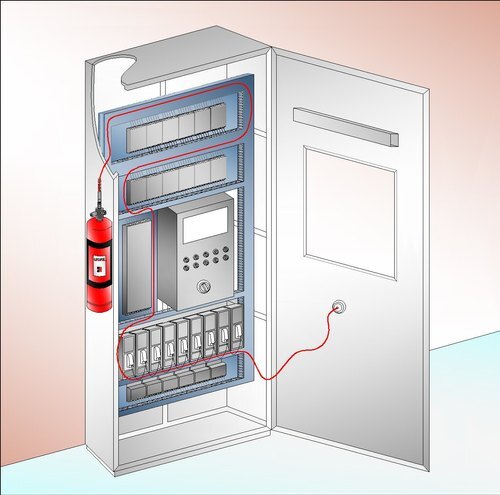
Electrical Panel Fire Suppression
25000 INR/Piece
Product Details:
- Color RED
- Warranty 1 YEARS
- Alarm YES
- Input Power WATT Watt (W)
- Usage FIRE SUPPRESSION SYSTEM FOR ELECTRICAL PANEL
- Temperature Range CELSIUS Celsius (oC)
- Material M.S
- Click to view more
X
Electrical Panel Fire Suppression Price and Quantity
- 25000 INR/Piece
- 1 Piece
Electrical Panel Fire Suppression Specification
- M.S
- FIRE SUPPRESSION SYSTEM FOR ELECTRICAL PANEL
- HZ Hertz (HZ)
- FIRE SUPPRESSION SYSTEM
- METER Meter (m)
- KG Kilograms (kg)
- 1 YEARS
- RED
- WATT Watt (W)
- YES
- CELSIUS Celsius (oC)
- FIRE SUPPRESSION SYSTEM FOR ELECTRICAL PANEL
Electrical Panel Fire Suppression Trade Information
- Cheque
- 100 Piece Per Month
- 7 Days
- Yes
- Free samples available with shipping and taxes paid by the buyer
- LOT
- Asia
- All India
- ISO & CE CERTIFICATE
Product Description
Electrical panel fire suppression is a critical aspect of fire safety in buildings and facilities where electrical panels are present. Electrical panels, also known as distribution boards or breaker boxes, house electrical circuits and components, and they can pose a fire risk due to factors like electrical faults, overheating, or short circuits. Fire suppression systems are designed to detect and extinguish fires quickly to minimize damage and protect occupants.
Here are some common methods and technologies used for electrical panel fire suppression:
1. Fire Detection Systems:
- Smoke detectors: These can detect smoke particles in the air and trigger an alarm, alerting occupants and the fire suppression system.
- Heat detectors: These activate when a certain temperature threshold is reached, indicating a potential fire.
- Flame detectors: These can detect the presence of flames and trigger alarms or suppression systems.
2. Fire Suppression Systems:
- Clean Agent Systems: Clean agents like FM-200, Novec 1230, or CO2 are commonly used to suppress electrical fires. They are non-conductive and leave no residue, making them suitable for electrical equipment.
- Water Mist Systems: Water mist systems use fine water droplets to suppress fires. They can be effective for electrical fires if designed and installed correctly to avoid electrical shock hazards.
- Dry Chemical Systems: Some dry chemical fire suppression systems are designed for use in electrical areas. They release dry powder to smother the fire.
- Automatic Fire Sprinklers: In some cases, traditional fire sprinklers may be used in combination with other suppression methods to protect against electrical fires, provided they are compatible with the equipment and installation.
3. Manual Fire Suppression:
- Portable fire extinguishers containing dry chemical or carbon dioxide can be strategically placed near electrical panels for immediate response in case of a small fire.
4. Enclosure and Isolation:
- Electrical panels can be installed in fire-resistant enclosures or rooms with fire-rated walls and doors to contain and isolate any potential fires.
5. Regular Maintenance:
- Regular inspections, maintenance, and testing of electrical equipment and suppression systems are crucial to ensure they function as intended.
6. Electrical Panel Design:
- Proper electrical panel design and installation can also reduce the risk of fires. This includes using circuit breakers, fuses, and wiring that are appropriately rated for the load, and ensuring proper ventilation.
FAQ:
Q. What is electrical panel fire suppression?
Ans: Electrical panel fire suppression refers to the methods and systems designed to detect and extinguish fires that may occur within electrical panels or distribution boards.
Q. Why do electrical panels need fire suppression?
Ans: Electrical panels contain circuits and components that can generate heat and potentially lead to electrical fires due to faults, overloads, or short circuits. Fire suppression systems are essential to prevent these fires from spreading and causing further damage.
Q. What are common fire suppression methods used for electrical panels?
Ans: Common methods include clean agent systems (e.g., FM-200, Novec 1230), water mist systems, dry chemical systems, and automatic fire sprinklers. The choice depends on the specific needs of the installation.
Q. Are there fire detection systems for electrical panels?
Ans: Yes, fire detection systems such as smoke detectors, heat detectors, and flame detectors can be installed near electrical panels to quickly detect signs of fire and trigger the suppression system.
Q. Can water be used to suppress electrical panel fires?
Ans: While water can be effective for some types of fires, it can be hazardous in electrical panel fires because it can conduct electricity and pose a shock risk. Water mist systems and careful design can mitigate this risk.
Q. How can I maintain and test my electrical panel fire suppression system?
Ans: Regular inspections, maintenance, and testing are crucial. Follow the manufacturers recommendations and consult with a qualified technician to ensure your system is in working order.
Q. Is it necessary to install fire-resistant enclosures for electrical panels?
Ans: Fire-resistant enclosures or rooms can help contain electrical fires and prevent them from spreading. They are recommended in many installations for added safety.
Q. Can I use portable fire extinguishers near electrical panels?
Ans: Yes, portable fire extinguishers containing dry chemical or carbon dioxide can be placed near electrical panels as a supplementary fire suppression measure. Ensure that they are appropriate for electrical fires and provide training on their use.
Q. What should I do if theres a fire in an electrical panel?
Ans: In the event of a fire in an electrical panel, follow your organizations emergency procedures, which may include activating the fire alarm, evacuating the area, and using fire extinguishers if safe to do so. Avoid contact with live electrical equipment.
Q. Are there regulations and codes governing electrical panel fire suppression?
Ans: Yes, local building codes and regulations often dictate the requirements for fire suppression in electrical panels. Its essential to comply with these codes and seek professional guidance.
Q. How can I prevent electrical panel fires in the first place?
Ans: Preventive measures include proper electrical panel design, regular equipment maintenance, avoiding overloading circuits, and ensuring good ventilation around panels. Training personnel on electrical safety is also crucial.
Q. Can electrical panel fires be extinguished without a fire suppression system?
Ans: In some cases, small electrical panel fires may be extinguished using a portable fire extinguisher. However, its essential to prioritize safety, and if the fire cannot be quickly controlled, evacuate and call the fire department.
FAQs of Electrical Panel Fire Suppression:
Q: What is the alarm feature of the Electrical Panel Fire Suppression?
A: The Electrical Panel Fire Suppression has an alarm feature.Q: What is the temperature range of the Electrical Panel Fire Suppression?
A: The temperature range of the Electrical Panel Fire Suppression is in Celsius (oC).Q: What is the material used for the Electrical Panel Fire Suppression?
A: The Electrical Panel Fire Suppression is made of M.S.Q: What is the warranty period for the Electrical Panel Fire Suppression?
A: The warranty period for the Electrical Panel Fire Suppression is 1 year.Q: What is the application of the Electrical Panel Fire Suppression?
A: The Electrical Panel Fire Suppression is designed for use as a fire suppression system for electrical panels.Tell us about your requirement

Price:
Quantity
Select Unit
- 50
- 100
- 200
- 250
- 500
- 1000+
Additional detail
Mobile number
Email
Other Products in 'Fire Suppression Systems' category
" We mainly want inquiries from Gujarat, Rajasthan, Madhya Pradesh, Maharashtra, Goa. "


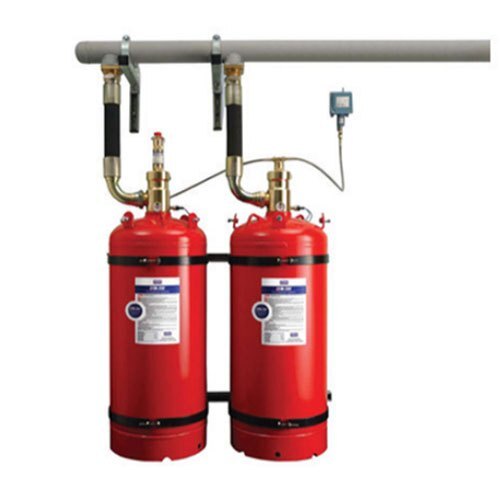
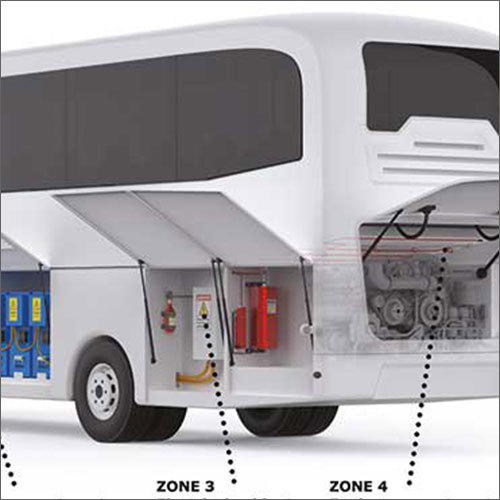
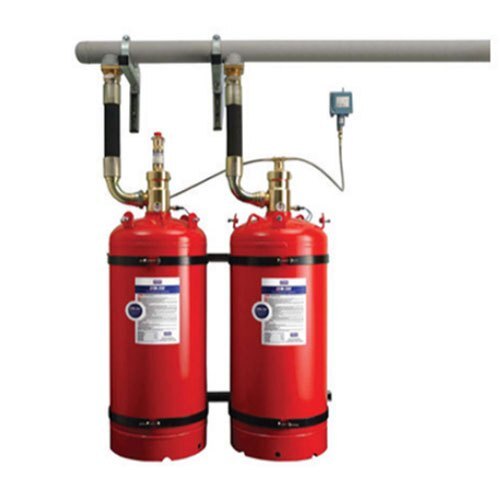
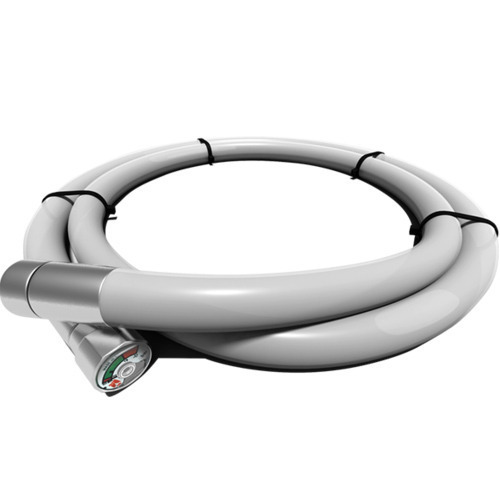

 English
English Spanish
Spanish French
French German
German Italian
Italian Chinese (Simplified)
Chinese (Simplified) Japanese
Japanese Korean
Korean Arabic
Arabic Portuguese
Portuguese